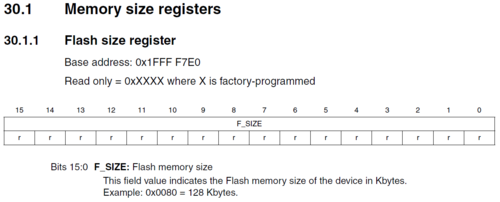Const and volatile type qualifiers
From Teknologisk videncenter
Contents
const
const means that something is not modifiable, so a data object that is declared with const as a part of its type specification must not be assigned to in any way during the run of a program.
volatile
The use of volatile ensures that the compiler always carries out the memory accesses, rather than optimizing them out (for example if the access is in a loop).
Memorymapped access to a register
Example 1
In the example below the register 32 bit register located in memory at address 0x40000 can be accessed through the uartreg pointer.
unsigned int volatile * const uartreg = (unsigned int *) 0x40000;
*uartreg = 0x80000000; // Assign 80000000 to the 32 bit register located at memeory address 0x40000
...some code...
*uartreg |= 0x1 // *uartreg's contents is OR'et to 0x1. New contents = 0x80000001
Example 2
| From the Cortex M STM32F107VCs Reference manual - See picture below - that the size of the embedded Flash can be seen in KB from the Flash size register at memory location 0x1FFFF7E0. |
Method 1: Reading the Flash size register uint16_t volatile * const flashsize = (uint16_t *) 0x1ffff7e0;
printf("Flashsize: %i KB\n\r", (int) *flashsize );
On the STM32F107VC the output to stdout would be Flashsize: 256 KB |
Method 2: Reading the Flash size register#define F_SIZE ((volatile uint16_t *) 0x1ffff7e0) // Flash Size
printf("Flashsize: %i KB\n\r", (int) *F_SIZE );
On the STM32F107VC the output to stdout would be Flashsize: 256 KB |
